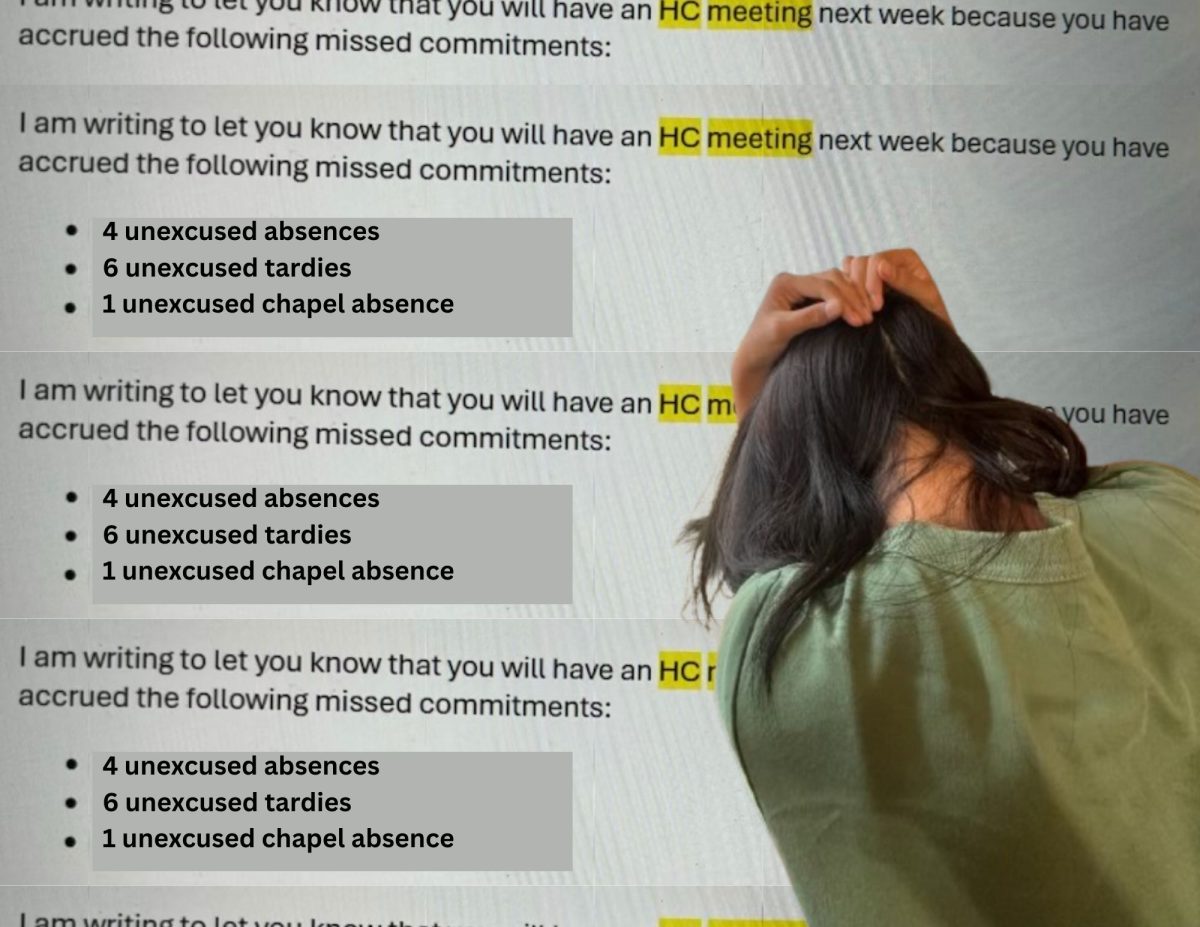Meeting with the honor council is never ideal for any Webb Student. The school rules listed out in the handbook help students stay clear of a meeting in Jackson Library. This year, a new change has been implemented, and the community is adapting to abide by a new school rule. While running a few minutes late and skipping chapel resulted in a measly 7/10 during lunch in past years, it is no longer the case –– to some extent.
“Last year, when you received a 7/10, you just head into the library and serve it during lunch,” Scott Wishek (‘25) said. “But now, there are consequences for an accrual of 7/10s.”
In the past, unexcused absences and tardies, dorm energy conservation, room checks, and other violations permitted students to receive 7/10s. This year, however, the “new” policy is that once students reach seven, they will most likely receive an HC meeting. However, Sarah Lantz, Dean of Students, states that this is actually not a new policy but instead a developed one with a greater focus on student attendance.
After the implementation of the HC policy, students have been expressing mixed opinions about its effectiveness and purpose: some believe it helps reduce the number of students receiving 7/10s, but others believe it is excessive and unnecessary.
Though this policy has been useful to remind students to meet their commitments, there are concerns arising from the student body.
“The possibility of a HC for excessive rule breaking helps the regulation of students, but there needs to be a balance,” Dorothy Ma (‘25) said.
Students, especially those new to Webb, are anxious about the implications of HCs on their permanent records.
“I’m afraid that if I get an HC from 7/10s, it’ll show up on my student record”, Claire Jeon (‘28) said.
Despite the large number of questions and concerns, the administrative body is working diligently to clear up common student misconceptions of disciplinary measures about the policy.
Yet, students have been expressing their worry about the policy’s impact on boarders and possible implications on students’ permanent records. Most cases of 7/10s are caused by violation of dorm rules or unexcused absences and tardies.
Many students believe that students who live in dorms are more impacted by this policy than day students.
“Boarders have a higher tendency to slip up and miss commitments as they can sleep in while day students can be woken up by their parents if they oversleep,” Rachel Liu (‘27) said.
Additionally, students feel more stress now when receiving emails from Mr. Galarsa due to the fear of receiving an additional 7/10 or HC. Many feel as though the guidelines should be less strict, and the policy should be adjusted to be more fair, especially those who receive 7/10s for smaller infractions.
“An HC from 7/10s should not be given out for minor rule violations. Like tardies, they should be given three chances before receiving an official one [7/10].” Felipe Murillo (‘25) said.
Since the boarding student population has a higher chance of receiving a lunch detention due to late check-ins or untidy rooms, there should be an adjustment to many aspects of the policy.
Additionally, there are concerns among the administrative body.
“We are definitely busier, but it’s more than that,” Scott said. “I would almost say these cases are harder than academic dishonesty [cases] because there’s no singular recommendation that is easy and could help multiple people. They are complicated, and there are no one-size-fits-all for these 7/10 HCs.”
Ever since the implementation of the 7/10 HC Policy, members of the honor council have been more involved than ever. However, with their student-to-student advice and suggestions, their participation in improving student life shows their desire to help set students up for success.
Another issue administrators are working on is the worry of receiving an HC. Most students interpret a 7/10 HC as a punishment.
“An HC is a tool to get students back on track rather than punishing them,” said Sarah Lantz, Dean of Students.
She states that a 7/10 HC is not different from a regular HC in violating school rules, the difference is the response as the meanings of these HCs differ: missing commitments could mean needed help while plagiarism means dishonesty. Therefore, the consequence depends on the severity of the offense. For example, one consequence that could help students, especially boarders, improve on meeting commitments is mandatory breakfast check-in with an administrator. At Webb, administrators and members of the honor council serve to help students with advice and mandatory breakfast check-ins rather than utilize disciplinary actions like a suspension, a reflection of how they handle 7/10 HCs.
As it was just established this year, the 7/10 HC Policy has no reports of plans to change though there may be a possibility. With the diligent efforts of honor council members and the deans, the 7/10 HC Policy has successfully helped decrease the number of students who constantly received 7/10s regardless of its recent administration.
“The HC and me both hope that with the introduction of this policy, students will understand the importance of meeting commitments to Webb life,” Dean Lantz said.
















